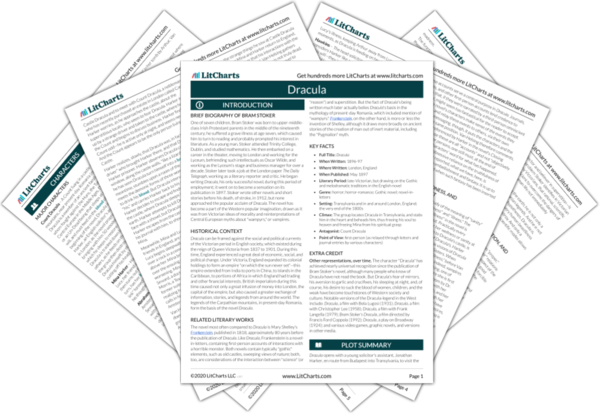Dracula isn't really a "novel" at all; it does not present itself as the work of a single author or narrator. Instead, Dracula consists of series of diary entries, letters, telegrams, memoranda, and occasional newspaper clippings, assembled and typed up by Mina Harker, with help from Seward, Van Helsing, Jonathan Harker, Quincey Morris, and Arthur, Lord Godalming. In a sense, then, Mina is the "author" of the book: she knits together these various accounts. This creates an intriguing "meta-narrative" effect: the characters in the novel are reading "the novel" as we, the reader, are making our way through it.
The novel is, essentially, a detective story, as the group finds out the nature of Dracula's violent activities and attempts to track him down and destroy him. The accounts knit together by Mina show how the group goes about catching the Count. Jonathan Harker's journal tells of his arrival to Transylvania, location of Castle Dracula; his eventual imprisonment there; his attempts to ward off Dracula and the Three Sisters; and his eventual escape to Budapest. Letters between Lucy and Mina track, primarily, the slow "illness" overtaking Lucy, which results in her becoming a vampire. Seward's diary contains information about the patient Renfield, an accomplice and acolyte of Dracula's, who refers to him as "lord and master." Mina's journal details Mina's own illness and refers to her hypnotic visions, which serve as a "conscious link" between the Count and Mina. Van Helsing notes down several events toward the end of the novel, including the final pursuit of Dracula; newspaper reports of supernatural events fill out the uncanniness of the narrative, from perspectives beyond those of Mina and the rest of the group.
These accounts serve a central purpose in Dracula. Journals, diaries, and other first-person accounts lend credence to events that, if they were narrated by a third-person omniscient narrator, might seem too fantastical for the reader to accept. When the novel's characters make sense of the events they have seen, and relay these events to others, via their own writing and messaging, though, it puts the characters and the readers in the same position. Van Helsing therefore comments, in a quotation referenced by Harker in the novel's Closing Note, that because these are all "accounts" and not "objectively validated" by other persons, one still must, at the end of Dracula, take the characters' word for what has happened. Despite this almost obsessive reliance on the truthfulness of the information being reported, what we have, here, is nevertheless subject to embellishment and fantasy. It is up to the reader to judge if and when such fantasy has been inserted into the narrative.
Writing, Journaling, and Messaging ThemeTracker

Writing, Journaling, and Messaging Quotes in Dracula
In no place [in the castle] save from the windows in the castle walls is there an available exit. The castle is a veritable prison, and I am a prisoner!

Unlock explanations and citation info for this and every other Dracula quote.
Plus so much more...
Get LitCharts A+At least God's mercy is better than that of these monsters, and the precipice is steep and high. At tis foot a man may sleep—as a man. Good-bye, all! Mina!
I am very, very happy, and I don't know what I have done to deserve it. I must only try in the future to show that I am not ungrateful to God for all His goodness to me in sending to me such a lover, such a husband, such a friend.
Early this morning a large dog, a half-bred mastiff belonging to a coal merchant . . . , was found dead in the roadway opposite to its master's yard, It had been fighting, and manifestly had had a savage opponent, for its throat was torn away, and its belly was slit open . . . .
I want you to do me a favor. Lucy is ill; that is, she has no special disease, but she looks awful . . . I told her I should ask you to see her . . . and she finally consented.
How good they all are to me. I quite love that dear Dr. Van Helsing. I wonder why he was so anxious about these (garlic) flowers. He positively frightened me, he was so fierce. . . . There is peace in its smell; I feel sleep coming already . . . .
Now that you are willing to understand, you have taken the first step to understand. You think then that those so small holes in the children's throats were made by the same that made the hole in Miss Lucy?
I suppose so.
Then you are wrong . . . . It is worse, far, far worse.
In God's name, Professor Van Helsing, what do you mean?
They were made by Miss Lucy!
Last night I slept, but did not dream. I must have slept soundly, for I was not waked by Jonathan coming to bed; but the sleep has not refreshed me, for to-day I feel terribly weak and spiritless.
He has so used your mind; and by it he has left us here in Varna, whilst the ship that carried him rushed through enveloping fog up to Galatz, where, doubtless, he has made preparation for escaping from us.











